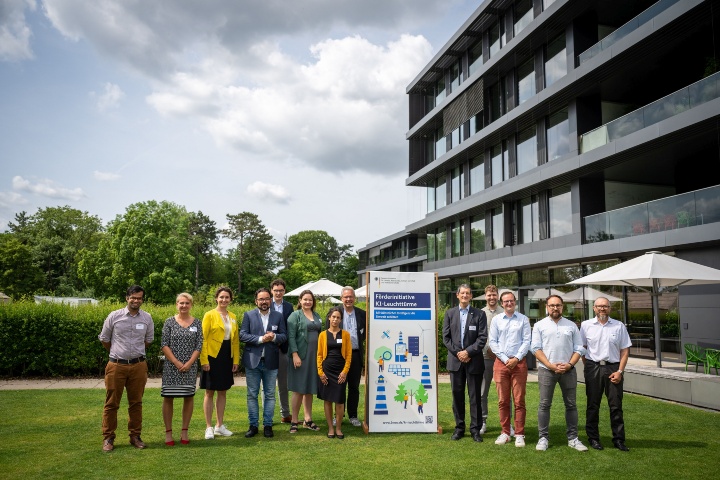A total of 5.5 million euros in funding has been approved by Christian Kühn, Parliamentary State Secretary at the Federal Ministry for the Environment, Nature Conservation and Nuclear Safety (BMUV), and Corinna Enders, Managing Director of Zukunft Umwelt Gesellschaft (ZUG - Future, Environment, Society), for four AI pilot projects in Cyber Valley, Tübingen, Baden-Württemberg on 27 June 2023. One of the projects is the University of Stuttgart's "Environmental Indicators for Digital Infrastructure & AI Applications (NADIKI)" project, which is run by energy expert Prof. Peter Radgen and computer scientist Prof. Marco Aiello in collaboration with the Sustainable Digital Infrastructure Alliance (SDIA).

The NADIKI project addresses the ecological challenge posed by the fact that AI consumes a huge amount of resources (e.g., energy, raw materials and rare earth metals) both for the necessary infrastructure and for the relevant applications, and thus generates significant amounts of CO2. To make the use of AI sustainable, it is therefore essential to make the best use of existing infrastructure in order to reduce or avoid building new data centers, servers, and network devices. At the same time, the utilization of AI systems should be optimized and resource consumption should be recorded and made transparent. As Prof. Peter Radgen of the University of Stuttgart's Institute of Energy Economics and Rational Energy Use (IER) explains, "Up to now, most data on resource consumption (and the resulting CO2 footprint) has only been estimated.” "The goal of the NADIKI project is to change this by providing transparent metrics about the digital infrastructure," adds Prof. Marco Aiello of the Institute of Architecture of Application Systems (IAAS).
AI measures its own footprint
The aim of the NADIKI project is to make the real energy and resource consumption and the associated CO2 emissions of AI applications available and transparent via an interface. It will then be possible to use this data to make informed decisions about resource utilization, thereby enabling a more efficient use of existing infrastructure. A given AI learning process, for example, could be rescheduled or performed in a different location, which would enable a better utilization of unused capacity in Europe and would reduce the need for new additional infrastructure. Alternatively, a given learning operation could be moved to a location where more renewable energy is available on the local power grid, thus reducing greenhouse gas emissions. Another thing that the NADIKI application will be able to do is to convert the data on power consumption and server hardware, cooling systems, and other infrastructure components into real metrics relating to greenhouse gas emissions and resource consumption. This would enable AI applications to calculate their own carbon footprint and would make their real-world consumption transparent.
Cost-benefit analysis interface and tools
AI and digital technologies ought to be based on a fact-based cost-benefit analysis, which contrasts positive environmental impacts with the potential negative impacts of their use. The NADIKI project will provide the appropriate interface and tools to perform such an analysis. The project will also enable an examination, definition, and implementation of the ecological requirements for AI to which end consideration will be given to the possibility of an environmental label, comparable to a seal such as the Blue Angel. All of the building blocks for the NADIKI project will be made available as "free and open source software" and with a freely accessible data base.
About the AI pilot projects funding initiative
The AI pilot projects are part of an initiative being conducted under the five-point program "Artificial Intelligence for Environment and Climate.". The program will contribute to the implementation of the German government's AI strategy whose objective is to make Germany and Europe a leading location for AI technologies whilst promoting the responsible and public-spirited development and use of AI. The German Federal Ministry for the Environment is funding projects that use artificial intelligence to overcome ecological challenges and which exemplify environmentally friendly, climate-friendly, health-friendly, and nature-friendly digitization.
Expert Contact:
Prof. Peter Radgen, University of Stuttgart, Institute of Energy Economics and the Rational Use of Energy (IER), Tel.: +49 711 685 87877, E-Mail
Prof. Marco Aiello, University of Stuttgart, Institute of Architecture of Application Systems (IAAS), Service Computing Department, Tel. +49 711 685-88464, E-Mail

